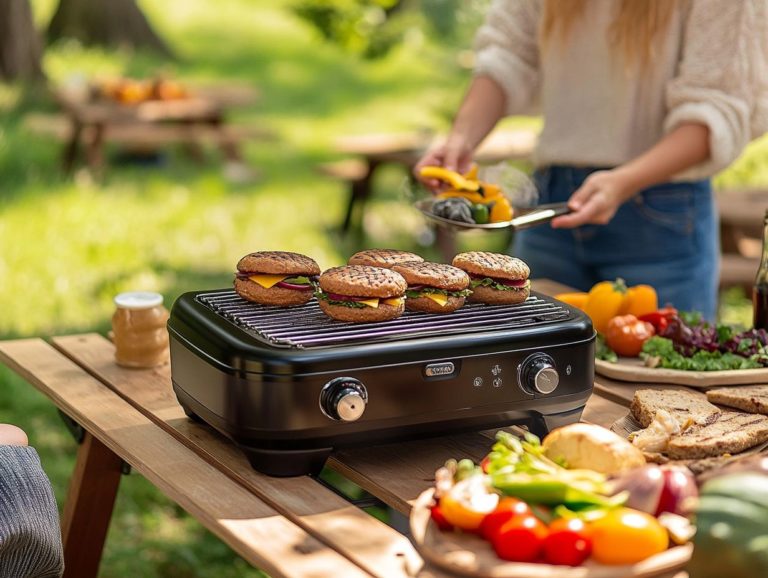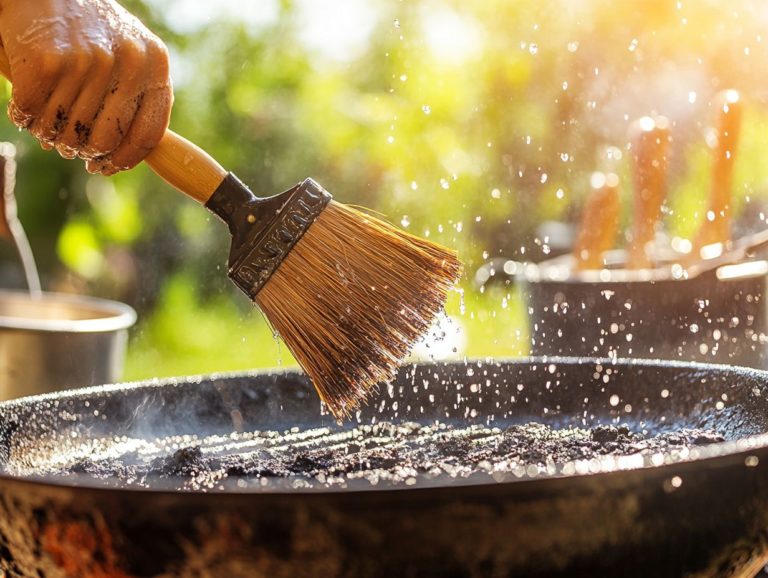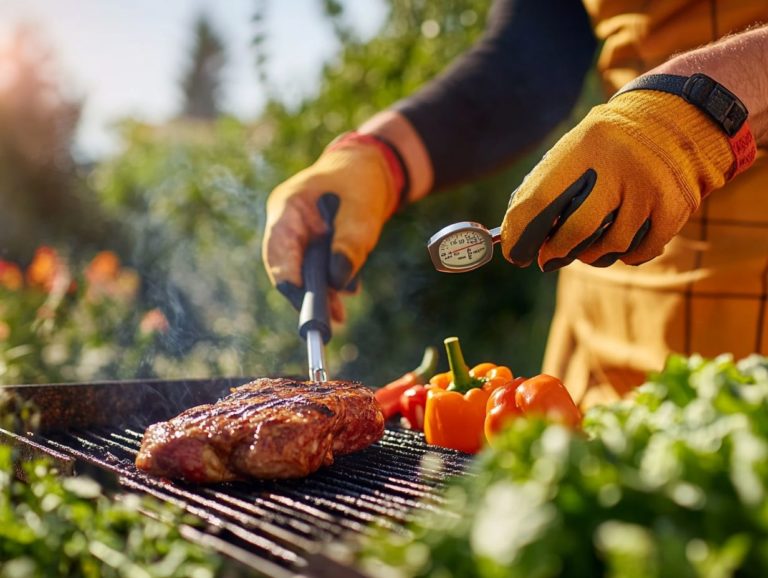What Are the Best Practices for Outdoor Cooking Clean-Up?
When it comes to outdoor cooking, the thrill of sizzling dishes and rich, smoky flavors is undeniable. However, don t forget the vital detail: clean-up is key to an amazing cooking experience!
Emphasizing proper clean-up creates a safe and enjoyable cooking environment while elevating the overall experience for everyone involved. This guide highlights the importance of maintaining a tidy cooking space, from pre-cooking preparations to effective waste disposal.
Ready to elevate your outdoor cooking game? Explore practical tips for cleaning during and after your culinary adventures, while discovering how to care for your grilling equipment. With these best practices in hand, savor the great outdoors without the burden of a messy aftermath.
Contents
- Key Takeaways:
- Importance of Proper Clean-Up
- Pre-Cooking Preparation
- Cleaning During and After Cooking
- Disposing of Waste
- Proper Waste Management
- Post-Cooking Clean-Up
- Frequently Asked Questions
- What Are the Best Practices for Outdoor Cooking Clean-Up?
- What Are Some Essential Supplies for Outdoor Cooking Clean-Up?
- How Can I Prevent Food from Sticking to the Grill?
- What Should I Do with Leftover Charcoal or Ashes?
- What Is the Best Way to Clean a Greasy Grill?
- Are There Any Eco-Friendly Options for Outdoor Cooking Clean-Up?
- How Can I Make Clean-Up Easier While Camping or in a Remote Location?
Key Takeaways:
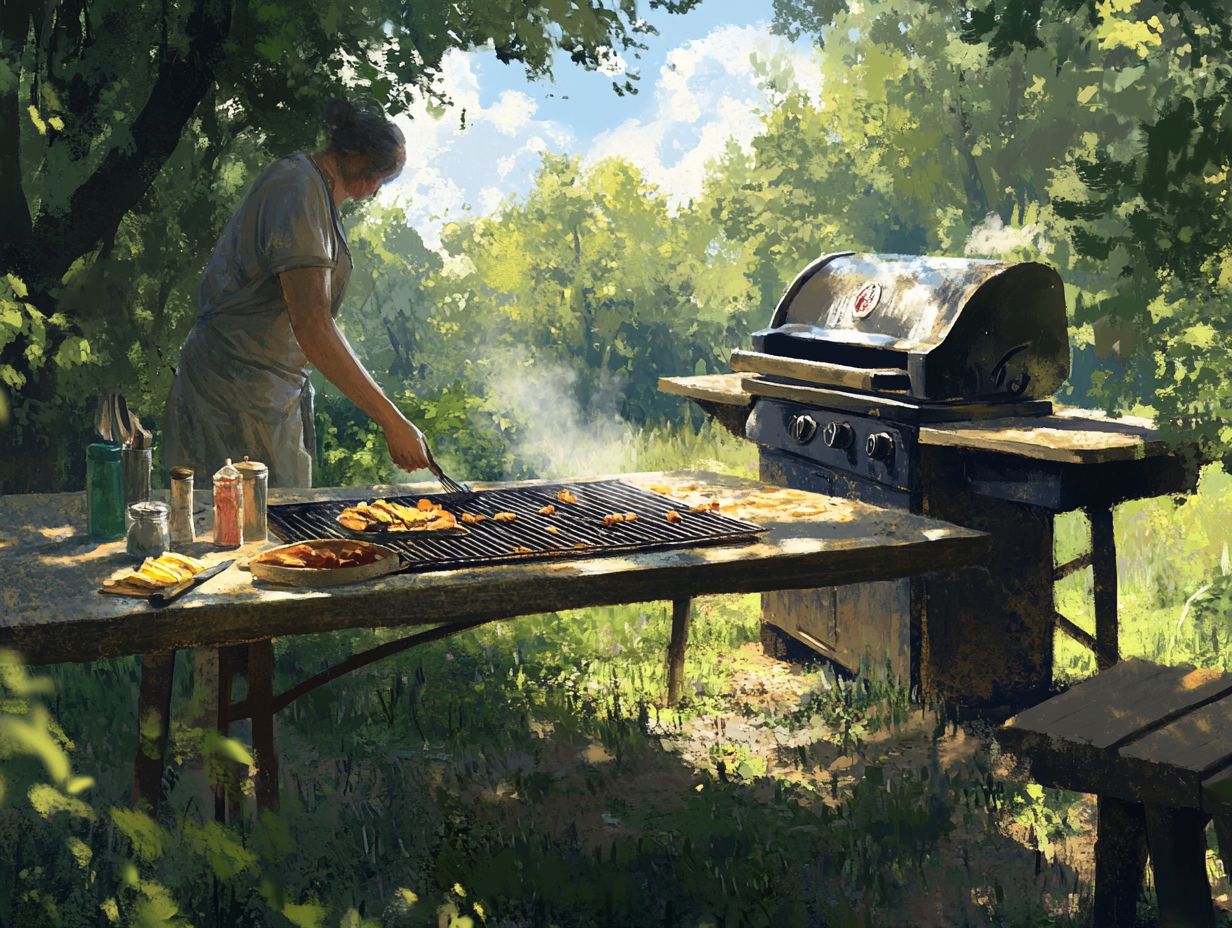
- Proper clean-up after outdoor cooking is crucial for maintaining a safe and hygienic cooking environment.
- Preparing and organizing a clean cooking space, along with having necessary cleaning supplies on hand, makes the clean-up process more efficient.
- It s important to dispose of waste properly, especially grease and oil, and to clean grills and utensils thoroughly to prevent contamination.
Importance of Proper Clean-Up
Clean-up after barbecuing is key to both the longevity of your grill or smoker and the safety of your outdoor cooking endeavors. Overlooking this essential step can diminish the performance of your equipment and introduce health risks from bacteria and grease buildup.
By following expert advice on cleaning and maintenance, you not only extend the life of your grill or smoker but also enhance your cooking performance, ensuring that your outdoor meals are safe and enjoyable for you and your guests.
Why Clean-Up Matters for Outdoor Cooking
Clean-up is absolutely essential in outdoor cooking. It prevents the growth of bacteria and ensures a hygienic cooking environment.
A thorough clean-up safeguards the long-term health of everyone enjoying the meal. Bacteria can thrive in areas littered with leftover food particles and moisture, leading to foodborne illnesses. To keep your cooking space safe, regularly wipe down surfaces with disinfectant wipes or a vinegar-water solution, especially after handling raw meat.
- Use separate cutting boards for fruits and vegetables to prevent mixing them and keep food safe.
- After cooking, wash utensils and dishes promptly; a simple soak in hot, soapy water can ease the process.
Establishing a cleanliness routine will protect health and elevate your overall cooking experience.
Pre-Cooking Preparation
Pre-cooking preparation is essential for a successful outdoor cooking experience. Start by thoroughly cleaning your grill or smoker to ensure optimal hygiene and performance.
This step involves meticulously cleaning all surfaces and utensils to minimize the risk of bacterial contamination. By taking these initial cleaning steps, you create the perfect foundation for an enjoyable and safe barbecuing experience.
Setting up a Clean Cooking Space
Creating a pristine cooking space is vital for your outdoor culinary adventures. It all starts with organizing your gear and ensuring that every surface is free from grease and food particles.
This practice boosts safety and significantly enhances your overall enjoyment of the cooking experience. Begin by gathering all your utensils, grills, and cookware, giving them a thorough wash.
Once everything sparkles, select a flat, stable area for your cooking zone, ensuring it’s distanced from potential contaminants like pets or refuse.
Wipe down tables and cooking surfaces with disinfectants, allowing them to dry and effectively eliminate bacteria. As you prep your ingredients, keep raw and cooked items separate to avoid mixing and ensure that each dish is safe to savor.
A clean environment reflects a professional mindset and demonstrates your respect for the food and those who will indulge in it.
Gathering Necessary Cleaning Supplies
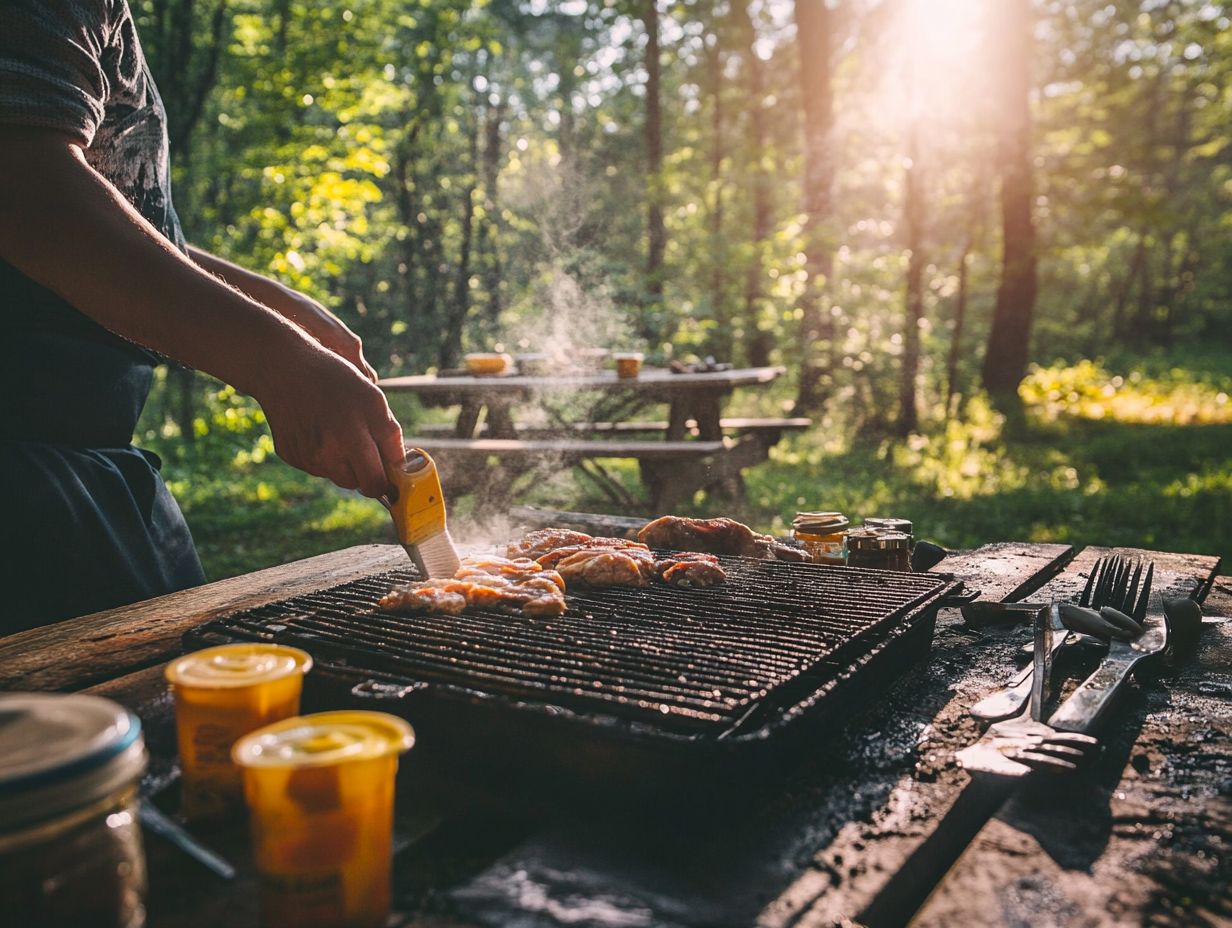
Gathering the right cleaning supplies is crucial for ensuring your grill or smoker is ready for an exceptional barbecue experience. Keeping things clean isn’t just about looks it’s vital for your health!
To keep things clean, gather a few essential tools. Start with a sturdy grill brush preferably one with stainless steel bristles to tackle stubborn food residues. Don’t forget to stock up on plenty of water for rinsing off cleaning solutions and for extinguishing charcoal if needed.
A reliable cleaning solution can be a game-changer for tough stains, making it easier to keep your cooking surface spotless. Proper hygiene is not just about aesthetics; it s vital for food safety and plays a significant role in ensuring your grilled delights are bursting with flavor.
Cleaning During and After Cooking
Cleaning as you cook and tidying up afterward is essential for preventing grease and food particle buildup. This approach ensures a safe barbecuing environment.
By adopting effective cleaning techniques during your culinary adventures, you simplify post-cooking clean-up and enhance the overall outdoor cooking experience for both you and your guests.
This proactive approach preserves the performance of your grill or smoker and eliminates lingering odors or bacteria, allowing you to enjoy your time outdoors with peace of mind.
Tips for Keeping a Clean Cooking Area
To maintain a pristine cooking area during your outdoor culinary adventures, embrace effective tips that emphasize hygiene and performance.
A tidy environment not only leads to delectable grilled delights but also drastically reduces foodborne illness risks. Practice good hygiene by consistently cleaning those grill grates before and after cooking to eliminate residues that could compromise flavor or lead to contamination.
Utilizing separate utensils for raw and cooked foods is key to safeguarding against cross-contamination. Regularly emptying grease trays and using disposable wipes or sanitizing sprays on surfaces keeps everything spotless, ensuring a hygienic space that enhances your grilling experience.
Prioritizing cleanliness ensures that your grilling efforts are enjoyable and health-conscious.
Cleaning Grills and Utensils
Cleaning your grill and utensils regularly is essential for maintaining hygiene and ensuring optimal cooking performance during your barbecuing adventures.
Neglecting this important task can lead to grease buildup, which not only compromises flavor but also creates a breeding ground for harmful bacteria. To tackle this effectively, use natural solutions like vinegar and baking soda or opt for commercial grill cleaners to handle stubborn residues.
Employ techniques such as soaking, scrubbing with stiff brushes, and using wire brushes designed for grills to achieve a spotless finish. By regularly addressing these areas, you extend the lifespan of your equipment and ensure a safer and more enjoyable cooking experience.
Disposing of Waste
Proper waste disposal is crucial for your outdoor cooking experience. It ensures hygiene and prevents environmental contamination, especially when handling grease and oil waste from barbecuing.
Mastering effective waste management keeps your cooking area clean and fosters responsible outdoor cooking practices. Following this vital guideline helps maintain a healthy environment while ensuring your cooking equipment stays in peak condition.
Proper Waste Management

Effective waste management is essential for maintaining hygiene and preventing potential hazards during your outdoor cooking adventures. To achieve this, you can implement several strategies that promote cleanliness and sustainability.
- First, separate recyclables. Use clearly labeled bins for plastics, metals, and glass to streamline the process.
- Be mindful of how you dispose of compostable materials. Place them in designated compost bins to significantly reduce your overall waste.
- Lastly, keep your cooking area tidy. Regularly clean surfaces and promptly dispose of food scraps to help keep pests at bay.
Start using these practices today to make your outdoor cooking safer and more enjoyable!
Dealing with Grease and Oil
Dealing with grease and oil waste during outdoor cooking calls for specific strategies that elevate cleanliness and hygiene. As a barbecue and grilling enthusiast, it’s essential to understand effective techniques for managing these pesky substances.
Use specific containers for disposal and employ absorbent materials to soak up excess oil. This can transform your cleanup experience. When it s time to clean, opting for biodegradable cleaning products cleaning products that break down naturally and are safe for the environment not only tackles the mess but also showcases your commitment to the environment.
By adhering to local regulations regarding grease disposal, you uphold a sense of responsibility to your community, preventing potential environmental hazards that arise from improper handling.
Post-Cooking Clean-Up
Post-cooking clean-up is a series of tasks designed to uphold hygiene and extend the lifespan of your cooking equipment after barbecuing. This phase requires you to meticulously clean all utensils and surfaces to prevent bacteria build-up.
By dedicating yourself to a consistent clean-up routine, you significantly enhance both the longevity and performance of your outdoor cooking gear.
Final Clean-Up Steps
The final clean-up steps after barbecuing are vital for maintaining your equipment’s condition and upholding hygiene standards.
Start by scrubbing the grill grates with a suitable brush to eliminate any food remnants and grease. Ignoring this task could lead to bacteria build-up, ruining the flavor of your future meals.
It’s also essential to empty any grease traps or containers, as stagnant grease can become a breeding ground for unwanted germs. Wiping down surfaces with a disinfectant is key to eradicating potential pathogens and promoting overall kitchen hygiene.
By regularly checking and caring for your cooking equipment, you extend its lifespan and ensure that each cooking session is both enjoyable and safe.
Storage and Maintenance of Cooking Equipment
Proper storage and maintenance of your cooking equipment, including grills and smokers, are essential for ensuring both longevity and optimal performance.
After a thorough cleanup, store these items in a dry, well-ventilated area to prevent moisture build-up, which can lead to rust and deterioration. Covering your equipment with suitable protective gear adds an extra layer of defense against dust, insects, and other contaminants.
Regularly inspect your equipment for any signs of wear or damage to catch potential issues before they compromise performance. Keeping your accessories organized and within reach enhances efficiency and promotes a hygienic cooking environment, minimizing the risk of cross-contamination.
Ultimately, treating your cooking gear with care will extend its lifespan and maintain its functionality, making your culinary endeavors all the more enjoyable.
Frequently Asked Questions
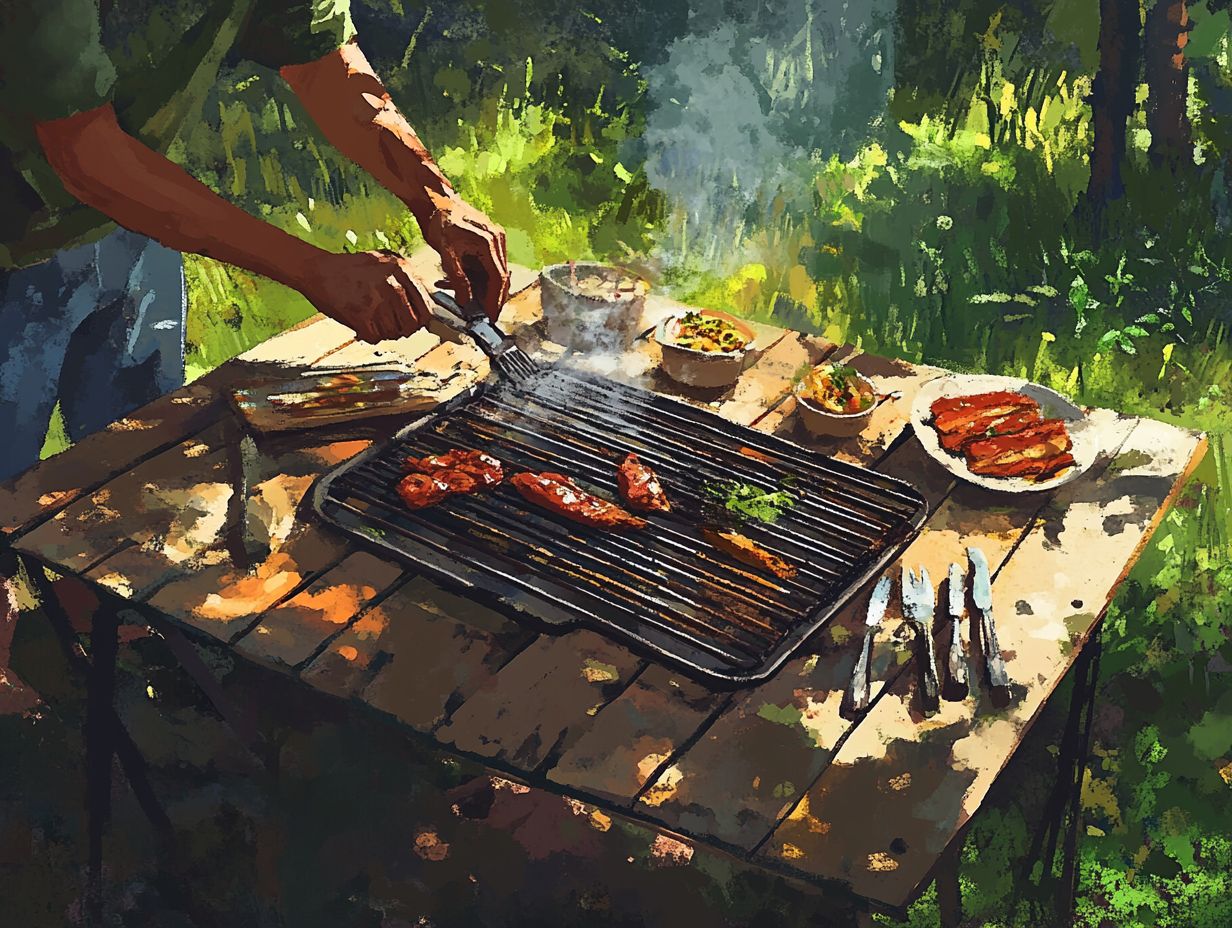
What Are the Best Practices for Outdoor Cooking Clean-Up?
Outdoor cooking is a fun and delicious activity, but cleaning up afterwards can sometimes be a hassle. Here are six frequently asked questions about best practices for outdoor cooking safety and clean-up.
What Are Some Essential Supplies for Outdoor Cooking Clean-Up?
Some essential supplies for outdoor cooking clean-up include paper towels, cleaning spray, a bucket of warm soapy water, and a scrub brush or sponge.
How Can I Prevent Food from Sticking to the Grill?
To prevent food from sticking to the grill, make sure to clean it before cooking by brushing off any remaining food particles and oiling the grates with a high smoke point oil like canola or vegetable oil.
What Should I Do with Leftover Charcoal or Ashes?
Allow the coals to cool completely before disposing of them. Once they are cool, you can either wrap them in aluminum foil and throw them in the trash or spread them in the garden as a natural fertilizer.
What Is the Best Way to Clean a Greasy Grill?
The best way to clean a greasy grill is to use a grill brush and warm soapy water to scrub off any grease and food residue. You can also use a mixture of baking soda and water as a natural cleaner.
Are There Any Eco-Friendly Options for Outdoor Cooking Clean-Up?
Yes, there are many eco-friendly options for outdoor cooking clean-up. You can use biodegradable or reusable plates and utensils, compost food scraps, and use natural cleaners instead of harsh chemicals.
How Can I Make Clean-Up Easier While Camping or in a Remote Location?
If you are camping or in a remote location without access to running water, bring biodegradable soap and a large tub of water to wash dishes and utensils. You can also use disposable aluminum foil or parchment paper to line the grill for easy clean-up.


